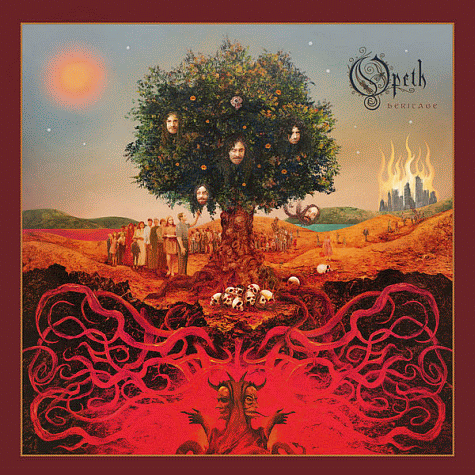OPETH - Heritage (2011)

It’s a rare thing to witness a band practically hitting the ground running with their debut album, and Swedes Opeth did just that back in 1995 with the landmark debut 'Orchid'.
It was one of those albums that arrived feeling fully formed, the band establishing its own identity within seconds, instantly setting themselves apart from the rest of the metal / prog world.
With a band like Opeth, though, the phrase 'fully realized' can never truly be used to describe one of their 'observances' (as they call their albums), because over the last 17 years the band’s music has been in a constant state of flux.
Here’s one progressive metal band that remembers the root word progress: as singer/guitarist/songwriter Mikael Åkerfeldt has grown up, so too has his music matured over the years.
He has become Opeth's driving force through to his dedication to perfectionism and his studied decision-making regarding the group’s methodical and deliberate shifts.
“I’ve been writing the material since the first album. I’ve been steering the ship for many years now and I’m quite comfortable. It’s something that I created and the people that have been in Opeth with me have helped make this into a very special band.”
Opeth’s tenth new album "Heritage" completely differs from the previous in that in this case we have something truly audacious. In fact, it’s the boldest move by the band since the debut, albeit in a vastly different way.
The band’s death and doom metal riffs are gone, and what "Heritage" does is bring the prog rock into in full bloom on an Opeth album for the first time.
The way the album eases listeners into this reinvention is clever.
The title track kicks things off with a surprising turn towards jazz piano, its melancholy strains hardly foreign to longtime listeners, which then leads into the Rush-like, stop-start riff of "The Devil’s Orchard". It slides from a jazz-infused guitar riff into a twisting and turning progressive roller coaster. At the center of the sound, the lyrics paint a colorful picture.
'God is dead' croons Åkerfeldt at the beginning of the song, a phrase that was most famously uttered by German philosopher Friedrich Nietzsche. It's a sentiment echoed by countless metal and rock bands. Nevertheless, when Åkerfeldt delivers the refrain, it's devilishly soothing. That's the real brilliance of "Heritage".
Paradise may be lost, but there's an epicurean ecstasy derived from listening to music this deep. "I Feel the Dark" rolls off classical finger-picked guitar into a haze of distortion punctuated by organs and classical undertones.
Then there's "Slither". It burns with one of the band's most infectious displays of Ritchie Blackmore-like guitar fireworks before crashing down alongside another crescendo of drums, bass, and keyboards.
"Nepenthe" shifts from a gorgeous, Moody Blues-derived opening section to a prog-jazz fusion jam led by a contagious little keyboard riff, atop which Åkerfeldt and Fredrik Åkesson shift into full-on King Crimson mode during the solos.
Acoustic piece "Haxprocess" see Åkerfeldt and Opeth broadening their sound even more by remaining silent, letting sustained notes express the mood rather than prog rock guitar noodling. The song is so toned-down that it’s easy to miss the odd little touches the band tosses in.
"Famine" revisits the labyrinthine song structure we’ve come to know so well from the band, but this time around there’s far more intimacy and warmth, highlighted by the lovely opening piano/vocal melody and lumbering, Deep Purple-esque jam during the latter half.
"Folklore", meanwhile, brings the album to a gentle climax, segueing form a pastoral, flute-tinged acoustic arrangement to the best riff on the record, led actually by Martin Mendez, whose bass solo accentuates and ultimately overwhelms a haunting piano piece, kicking into a controlled yet still bracing groove, the fastest on the album.
Opeth have spent over two decades steadily amassing a body of work that is at once possessed of a fervent and unrelenting devotion to aesthetic progression and perfection.
However, what "Heritage" is most about is the musical evolution of Åkerfeldt, and on this fascinating, strange, and at times ground-breaking record we hear him discovering new, fertile musical territory, and you get the sense that this will open up a huge new realm of possibilities for Opeth and the Prog Rock genre.
Clinically produced by Åkerfeldt and mixed along with label mate and friend, Porcupine Tree frontman / guitarist Steven Wilson, the sound is clean, spacy, sometimes ethereal.
"Heritage" is the best album in Opeth's career, and one of the most original from the actual Prog Rock scene.
01 - Heritage
02 - The Devil's Orchard
03 - I Feel the Dark
04 - Slither
05 - Nepenthe
06 - Haxprocess
07 - Famine
08 - The Lines in My Hand
09 - Folklore
10 - Marrow of the Earth
Mikael Åkerfeldt - Vox, Guitar
Martin Mendez - Bass
Martin Axenrot - Drums
Fredrik Åkesson - Guitar
Joakim Svalberg - Piano
BUY IT !
www.amazon.com/Heritage-Opeth/dp/B004G25V9S


0 comments:
Post a Comment